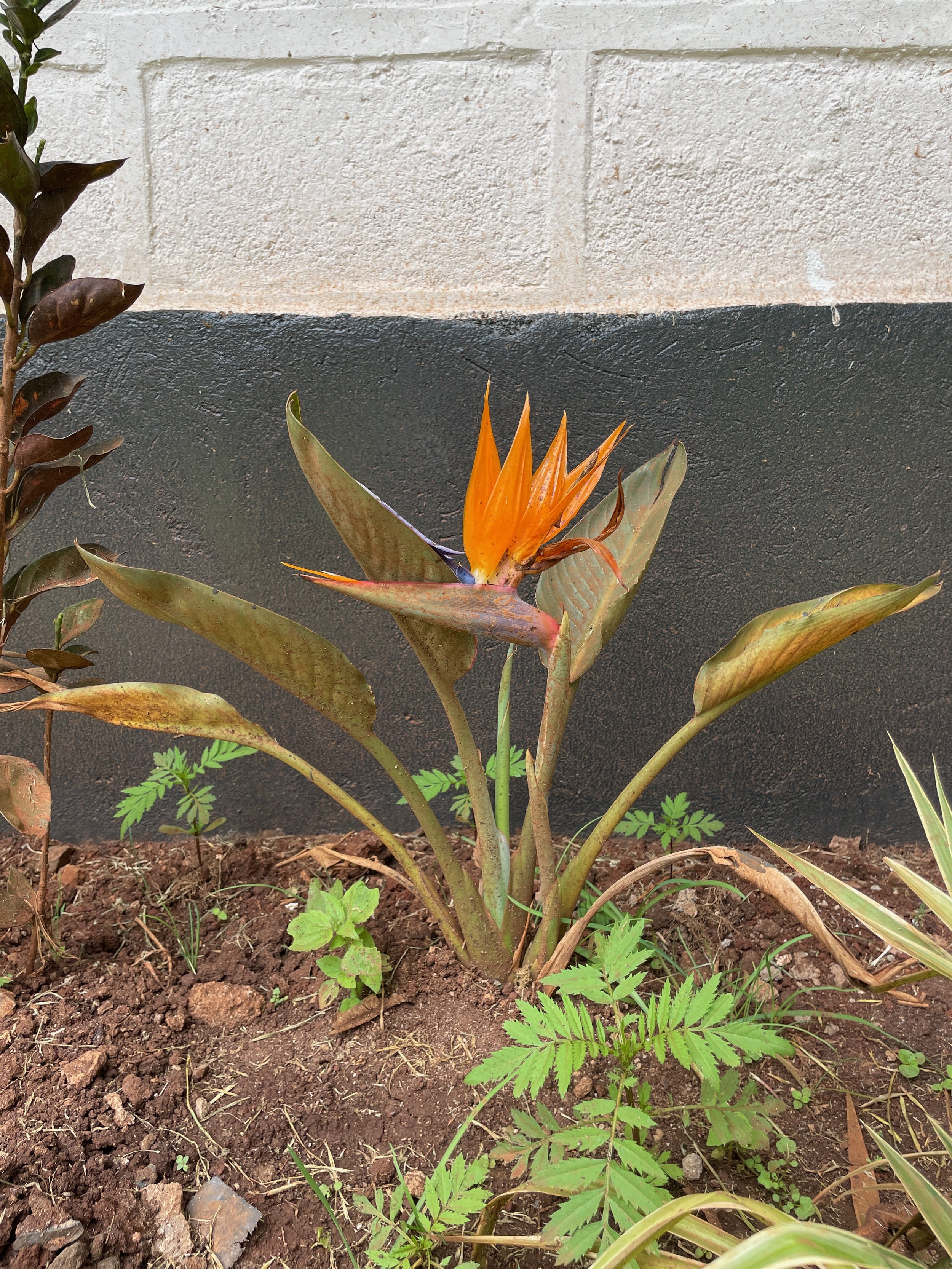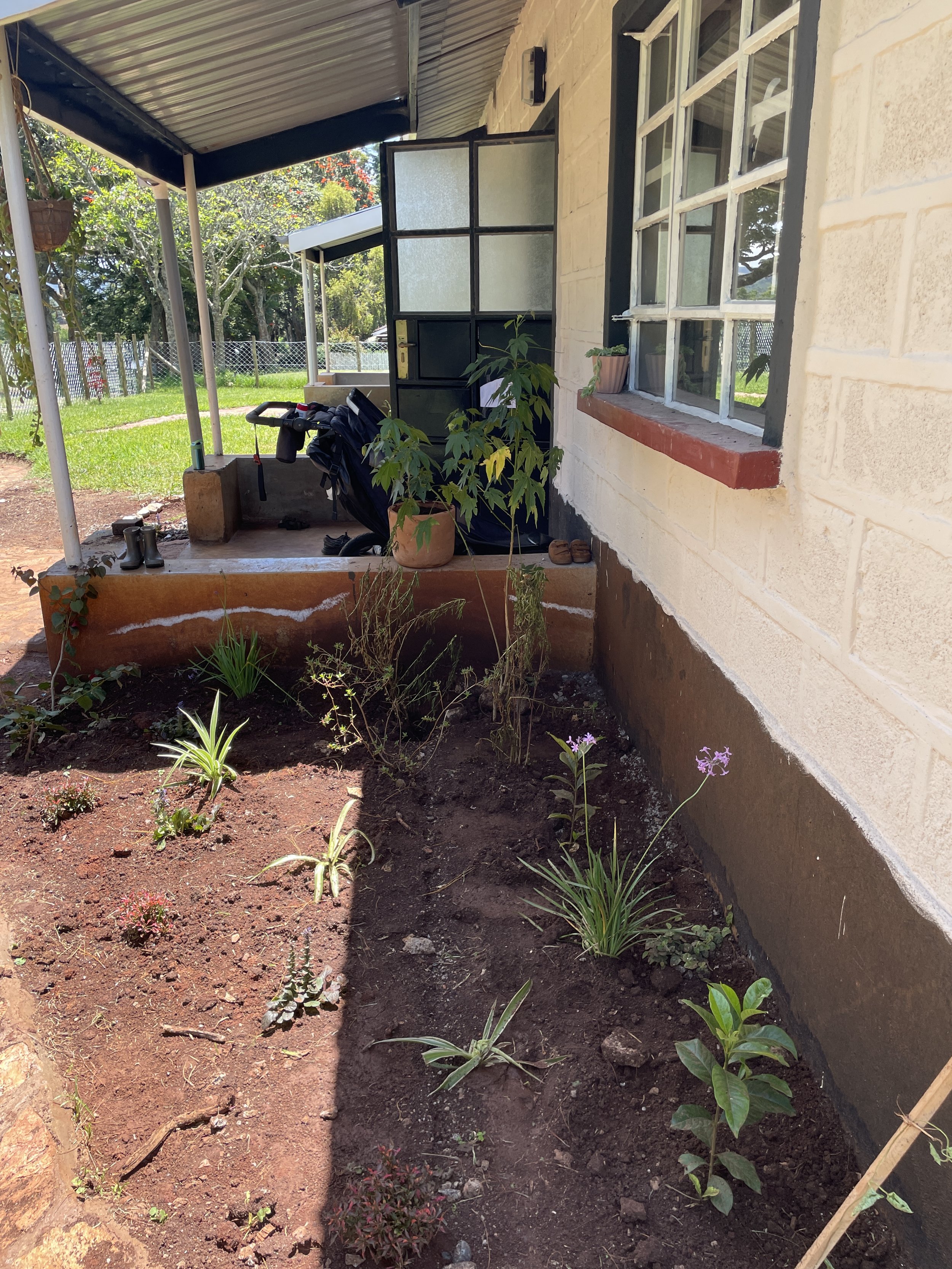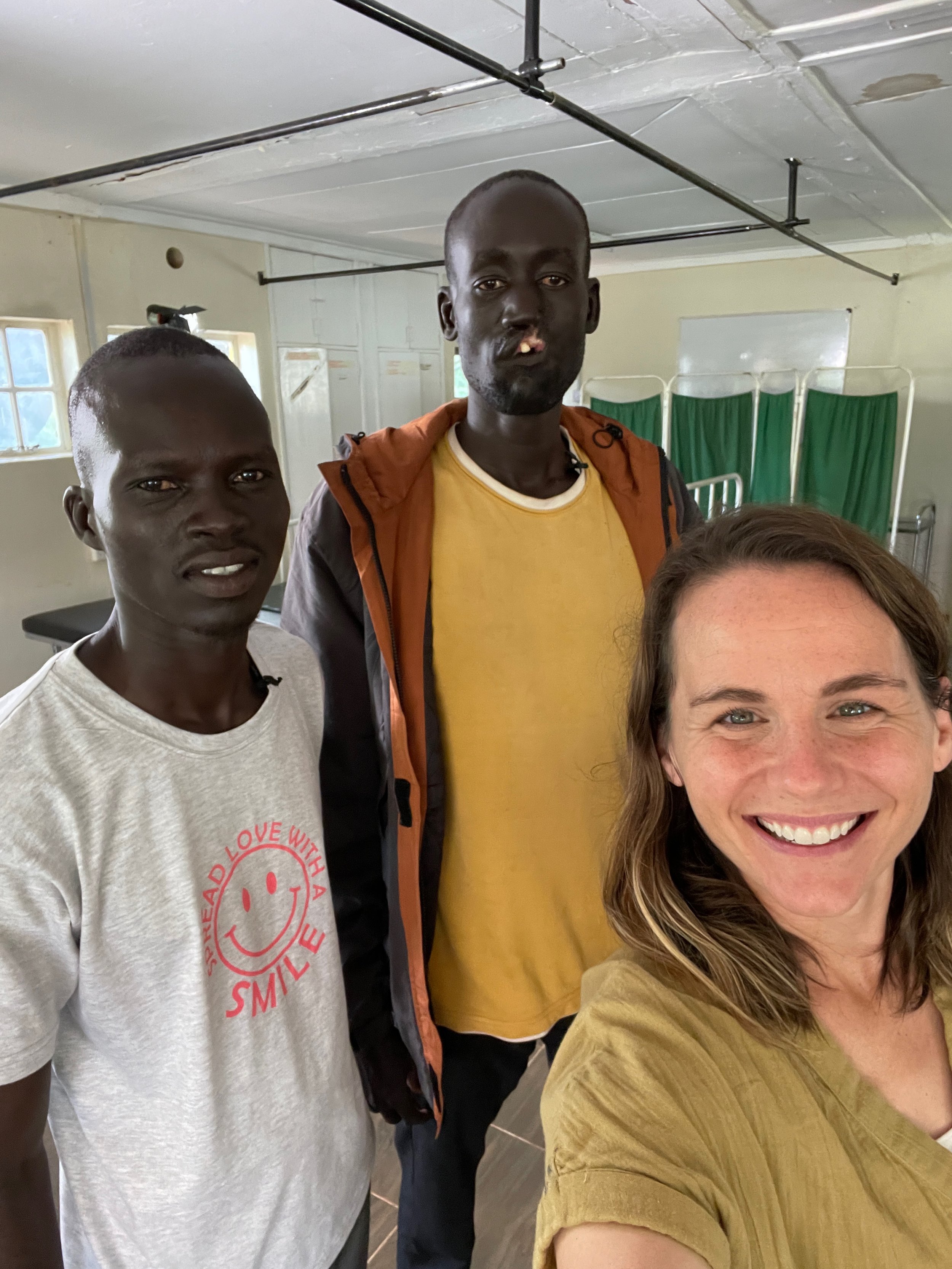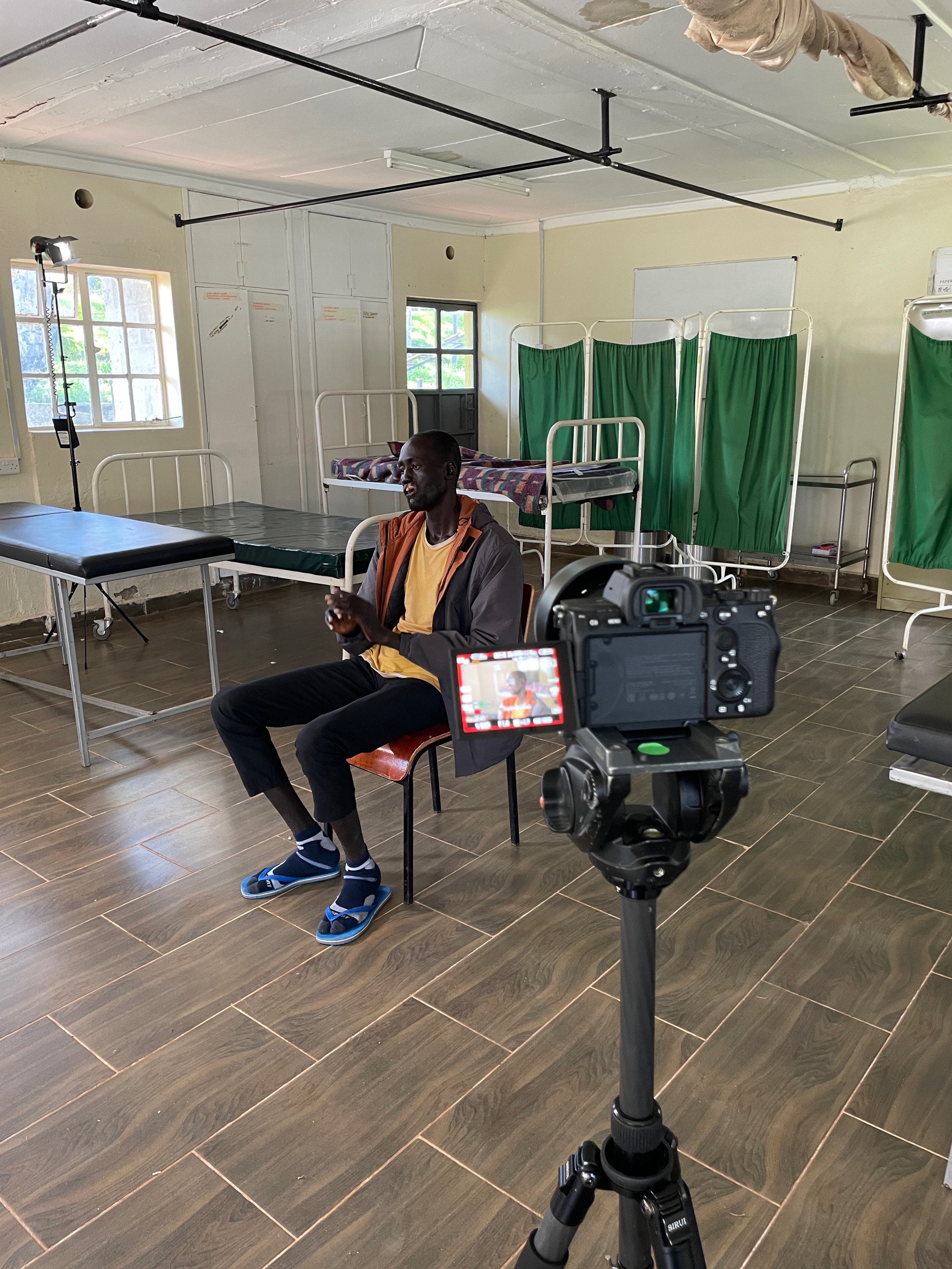Reflections on Six Months in Kapsowar
Last month I landscaped our front yard (if you want to call it that). Basically, I just picked out a ton of plants at the nursery and planted them in a way that seemed appealing to me. My vision is a yard bursting with color, overflowing with a lush and full flowerbeds.
Back in the States, you can hire a company who can plant full-sized bushes and trees so that almost immediately, your landscaping vision can come to life. But here, you can really only buy seedlings. So patience is required.
When my plants first made their hour and a half journey to Kapsowar, everything seemingly died. All the flowers fell off the previously healthy looking plants so that just leaves, or even brown sticks, remained. Needless to say the plants were a bit shocked from the transition to their new environment.
As I planted them hesitantly, our gardener Wisley encouraged me - “They will grow.”
Every morning since then I’ve eagerly surveyed each plant looking for a sign of life. “Ah! A bud for a new flower is here! Look! A new shoot is coming!”
My plants are indeed growing in this new soil.
New growth in my monastera! It took awhile for the roots to settle in - but it is indeed growing.
I obsessively checked my bird of paradise plant every day, waiting for it’s distinctive orange flower to unfurl
All the flowers had fallen off this fuchsia - but it’s back! Displaying its beautifully intricate blooms.
I was scrolling my photo albums from six weeks ago and caught a picture of my plants just after I planted them. I was amazed at how much growth had in fact happened since only September. Because I see them so often, I haven’t noticed how far they had actually come.
I have more confidence now that my vision for our front yard, and our lives here, is possible.
It just takes time.
Here is when we planted early October…
Here is where we are in November! It’s not dramatic - but life is indeed happening
My plants are a reminder to me of my own journey of being uprooted and planted in new soil in Kapsowar. It was a shock to the system at first.
I realized the other day that every in-person interaction (outside of Jack and the kids) I’ve had in the past 6 months has been with a brand new person. From friends to coworkers to acquaintances - everyone has been completely new to us. We are starting from scratch relationally with so many people, and many of them from a completely different language and culture than our own.
The “how-to’s” of day-to-day life have all changed. From how to acquire groceries, to bleaching all our produce before we eat it, to giving the kids baths in buckets, to just getting used to our entire life existing within in a 2km radius.
I look back on what we knew when we arrived six months ago and we have learned a LOT. We are still small seedlings but we indeed growing and putting down roots.
Plants don’t bear flowers - much less fruit -overnight. And lives that bear fruit for the kingdom don’t happen overnight.
They take time. Lots of time.
Nevertheless, culture shock is real. It’s still hard to really put it into words the way that it can sneak up on you. It has much less to do with being “shocked” by a language, food, or dress - it’s often much more subtle than that.
I think most people, like I did, thought the hard part in moving to Africa would be the lack of comfort and convenience. You think of the lack of grocery stores, cold showers, power outages, and worst of all (at least for me)- no Amazon Prime! These things can be challenging for sure, but they are much easier to adjust to than the more complex cultural nuances you have to now navigate all throughout your day.
Culture shock feels a lot less like “Ah, the power is out again!” And much more like ten small things that happen throughout the day that just slowly wear on you. For example -
Not wanting to greet that lady who sells vegetables every time you pass multiple times a day - but you know it would be rude not to
Figuring out what person is responsible to help you with the problem you need to solve
Not being able to read a person’s body language - are they okay? Annoyed with me? Indifferent? Do they think I’m crazy?
Delegating a task to a person to the correct person and them totally dropping the ball or just never responding. Which seems to happen over and over again with multiple people. Followed by questioning- am I the one doing something incorrect here? What am I missing?
Getting stir crazy because all of your of days happen in the same 2km radius
People constantly asking you for money and trying to discern if you should give or not
Always having a group of children wanting to play with you or staring at you and your kids wherever you go
The struggle of one seemingly simple problem becoming five more problems that need to be solved first before you can address your original problem
But somehow the mental load of dealing with all these small struggles slowly accumulate. And by the end of the day - you are just absolutely exhausted.
Oh, and add to that the physical and mental demand of caring for two young kids.
My friend texted me the other day, eager to know how I was doing. I told her if she ever wonders, just to assume that I’m tired - and she’d be correct 95% of the time.
Nevertheless.
The past couple of weeks I’ve been hanging out with six patients who came to Kapsowar all the way from South Sudan. One of our doctors had met them while doing cleft lip surgeries on an outreach with Samaritan’s Purse. But these patients had more significant reconstructive needs than could be done on that trip.
I went with another mom to pick them up at the airport on their small chartered flight from South Sudan. I was surprised by just how severe their facial deformities were. Some had totally lost their lower jaw to a bacterial disease they had as a child, growing up in war-torn Sudan. Since then some of them have not been able to even eat solid food, or even put their tongue inside their mouth.
It’s hard to comprehend the impact this has had on their education, their social status. Their whole life.
I’ve been checking up on them at the hospital and interviewing them one by one to hear their stories. All of them are essentially farmers in South Sudan, living in small villages with very limited access to healthcare. Not only that, but South Sudan has spent much of the past decades at war, which has totally upended their life as well. One of the patient spent 13 years living in the bush to avoid the rebel army.
Needless to say - they’ve been through a lot.
And now here they are - bravely entering a whole new country unknown to them, getting on an operating table to have their face reconstructed by these white doctors with drills and needles.
Talk about bravery.
John Laat is a cattle and subsistence farmer who lives in a village in South Sudan, accompanied by Jacob, his translator.
Filming someone in a foreign language is no joke, but it is fascinating to hear their perspectives.
This week I’ve followed them into the operating room for their first surgeries. Watching them as they get on the table, fall asleep, and let foreign doctors literally reshape their faces. One man was even brave enough to allow them to intubate him through his nose, while awake and without any sedation, because he could not open his mouth due to his deformity.
I’m standing back in the operating room, filming this, and just absolutely blown away. Amazed at our doctors, who have been through years upon years of training, and are able to work in such a limited environment. Amazed at all they can do - from sewing blood vessels back together, to unlocking a jaw that’s been fused, to creating a lower jaw that wasn’t even there before.
But most of all, I’m amazed at these patients. For all they’ve been through and faced in their life. From their parents being captured by rebel soldiers, to enduring the mockery of their peers to the point where they stopped attending school. They have faced trauma with a capital T.
They are strong. They don’t feel sorry for themselves at all. They are brave, confident, grateful, and friendly. They are thankful for the opportunity to be here, and they are simply ready to receive whatever the doctors are able to do for them.
I, on the other hand, just about broke down this week when I dropped my iPhone and the screen cracked. If I’m honest, these guys makes us Americans look like the most fragile humans that have every existed.
John Laat going into surgery. His last attempt at a hospital in Uganda had failed. So he was brave to give it another shot.
Laat is a cattle farmer in South Sudan and doesn’t speak Swahili. He didn’t grow up around surgeons and modern medicine. So it takes some serious faith and trust to be getting on this table.
When I gave birth to Micah at the hospital in San Diego, I was not in a room. I was in the (ahem) birthing center. I could adjust my bed and the TV with my remote. I could order my meals off a menu. I could look at the view across the city. Heck, I could even take a bubble bath if I wanted to.
The life of a patient in the US feels like life on another planet compared to the experience our patients at Kapsowar have. Let’s just say, no one is catering to you here. You want some juice after your 15 hour surgery? Welp, I hope you have a friend who will bring you some. You are in active labor and having a baby? Great! Did you bring the bedsheets, gowns, toilet paper, toiletries, pads, and diapers for your delivery and recovery? If not, you’ll need to. You just had a 10 hour procedure where your jaw was opened for the first time since the age of 7?! Amazing! Here’s your room and we’ll check on you in the morning. Nite.
Now, I don’t want to belittle on our hospital at all here - we genuinely are the best in the region! I think this just goes to show how low the bar is. Our patients get three meals a day - most hospitals don’t even feed you. Most hospitals don’t even have a doctor seeing their patients daily, and ours are always available.
But again - I feel like I’m living in two worlds. How does THIS exist on the same planet with where Micah was born in San Diego?
I’m just amazed at what the surgeons are doing - taking bones from legs, putting them in jaws. Taking blood vessels from arms and re-connecting them in the face. It’s pretty mind blowing for us non-physicians.
Despite how far we have to go, I know that our mission hospital is doing so much good.
When I see the patients get on the table, and having our two talented plastic surgeons give them a new future - all the stressors and frustrations of moving to a new culture melt away. I think of all the good our hospital is doing to care for people in so much need - and our being here is an absolute no brainer.
I think of the story I am documenting, a story that wouldn’t be told otherwise.
I think of a baby who went home with his mother last week. A baby, who I am positive would not have made it, without Jack’s presence here.
I think of these patients from Sudan who will have life-altering surgeries because of surgeons who gave up their 500K salaries to move here with their families.
I’m not saying we are the heroes of this story. My point is that I can’t get over the absolute privilege that our being here really matters.
When was the last time you felt that what you did really, tangibly, made a difference in the life of someone in need?!
You want to talk about dopamine?!
Jesus was right. When you give up your life for him, you actually find it. It’s not in a nice house in a nice part of town. It’s not in a prestigious career. It’s not in comfort.
There is a deep, deep satisfaction in laying your life down for the sake of another. For your life being for something bigger than yourself. For truly seeking the Kingdom in your daily life. It’s definitely not comfortable. It’s not glamourous. I’m not sure how to even put it into words.
But let’s just say it’s a life worth living.
Our days are full of so much complexity and exhaustion crossing cultural hurdles. Most days feel mundane. Most days you wonder, “Am I even making a difference by being here?”
But my plants keep reminding me - the Kingdom often comes subtly. With much perseverance and steadfastness. Over many seasons.
And every so often - I catch these small flowers unfolding - these glimpses of the beauty in our being here. And it makes it all so, unquestionably, worth it.














